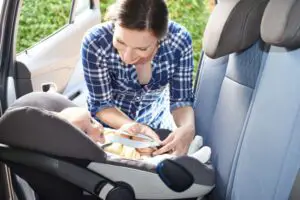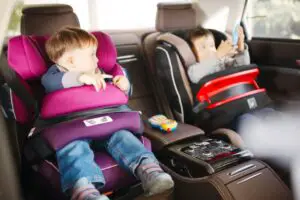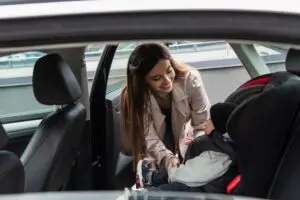According to studies, kid safety seats minimize the danger of deadly injury by 71 percent for newborns and 54 percent for toddlers when properly placed.
Car seats make a huge difference, so every parent should use them for as long as possible.
Car seat laws in Pennsylvania say that children under the age of 2 must ride in a rear-facing car seat, whereas children over the age of 4 must ride on a forward-facing car seat.
It is also said that these children can transition to a booster car seat, typically around the age of 8 and when they outgrow the previous car seat.
This article will help you learn about the guidelines of the car seat in Pennsylvania, including various other related rules, so you can be more informative and make reliable decisions.
To achieve that, be sure to read the article until the very end.
Table of Contents
- 1 Pennsylvania Car Seat Requirements By Ages
- 2 Car Seat Weight And Height Requirements In Pennsylvania
- 3 Type Of Car Seat Laws In Pennsylvania
- 4 When Is The Time For My Child To Sit In The Front Seat In Pennsylvania?
- 5 What Happens If You Leave Your Child In A Car In Pennsylvania?
- 6 Taxi Car Seat Laws In Pennsylvania
- 7 Pennsylvania Law Regarding Car Seats In Accidents
- 8 Uber Car Seat Laws In Pennsylvania
- 9 Conclusion
Pennsylvania Car Seat Requirements By Ages

Every parent needs to know about the rules of car seats and what the seat requires so they can be sure for how long their child must sit on it.
Many parents tend to make the mistake of moving their child too early from a seat which can be extremely dangerous.
Read this section to find out what you must do as a parent.
1 Year Old
At the age of one, children are too young and naive.
For safety reasons, it is said that the child must be situated in a rear-facing car seat. This can also be an infant-only car seat if the child is less than 20 pounds to 30 pounds.
2 Year Old
According to the law, the rear-facing car seat is used in Pennsylvania to move children at two. This can be a convertible rear-facing car seat with more height and weight limits.
3 Year Old
Children at three weighing less than 40 pounds must be secured on a rear-facing car seat.
Many parents use 3-in-1 convertible car seats. This can be beneficial because it allows more room for the child and can be easily adjusted.
4 Year Old
Coming to children at the age of four, many parents either transition to a forward-facing car seat or let the child stay on a rear-facing car seat.
Well, the transition depends on the weight, which is more than 40 pounds, and the height, which is more than 4’9 inches.
5 Year Old
At this stage, most children transition to the forward-facing car seats.
The 3-in-1 convertible car seat can be adjusted according to the child’s physical growth, so using the seat would not be much of a problem.
6 Year Old
At the age of 6, when the child is over 50 pounds and the height is over 4’9 inches, the forward-facing car seat is used.
Many manufacturers nowadays design car seats that can withhold extra weight limits, so this would not be an issue.
Moreover, parents should keep their children in a car seat for as long as possible. The more they transition, the more children are unsafe.
7 – 9 Year Old
From the ages of 7 until 8, the child either rides on the forward-facing car seat or a booster car seat.
However, a booster seat is a reliable option if the child weighs more than 50 pounds and the height is also more than 57 inches.
When the child is 9, according to Pennsylvania law, the child must be situated with the vehicle’s seat belt. This is only acceptable if the child has already overgrown the booster seat.
10 Year Old
Lastly, when the child is ten, he/she should continue sitting in the vehicle with the seat belt on. Parents should only allow the child to sit in the back seat until age 13.
Car Seat Weight And Height Requirements In Pennsylvania

Now it is important to look at the car seat requirement according to the weight and height limits.
Age is an important factor, but these two factors are also helpful in determining when the child can move to a different seat.
For the rear-facing car seat, the child should be around 20 to 30 pounds and the height less than 4’9 inches.
For a forward-facing car seat, ensure the child is up to 40 pounds and over 4’9 inches.
And lastly, for a booster car seat, a child must be over 50 pounds, and the height should also be more than 57 inches.
Type Of Car Seat Laws In Pennsylvania
As you know by now, you must use all three car seats in Pennsylvania. To make it simpler for you, here I will be discussing those car seats in detail. Make sure you read this very carefully.
1. Rear Facing Car Seat
Kids must travel in a rear-facing seat from when they are born until they are two years old. The height, as well as weight, should not exceed the manufacturer’s recommended limits.
Aside from that, children from the age of two until four must be buckled into a rear-facing car seat designed for their age group.
2. Forward Facing Car Seat
Kids between the ages of two and four must travel in car seats that are either rear-facing or forward-facing, however, depending on the child’s size and weight.
Experts advise that you keep your child in a rear-facing seat for as long as possible if he or she is within the height and weight limits.
3. Booster Seat
When your youngster is between the ages of four and eight, Pennsylvania law requires that you utilize a booster seat until he/she outgrows it.
When Is The Time For My Child To Sit In The Front Seat In Pennsylvania?
When the airbag is triggered, it is illegal to obtain a rear-facing seat in the front seat, according to the legislation.
Aside from that, Pennsylvania law does not specify a minimum age for your kid to be seated in the front seat of the vehicle.
The Pennsylvania Department of Transportation, on the other hand, advises that your children ride in the rear seat until they are thirteen years old.
What Happens If You Leave Your Child In A Car In Pennsylvania?
According to the law, it is declared to be illegal to leave a child that is under the age of six in a car in Pennsylvania.
A person that does this will end up getting penalties. It is also worth mentioning that each child left alone is considered a separate violation.
Taxi Car Seat Laws In Pennsylvania
If you are traveling with your child, in public transport like a taxi car, primarily under the age of four, you are obliged to have a car seat with you so he/she can be secured in place.
This is important to follow, and if you fail to do so, you might end up with expensive fines.
Pennsylvania Law Regarding Car Seats In Accidents
Car seat regulation in Pennsylvania were enacted to ensure that children were as safe as feasible in the case of a collision.
However, they will only be able to achieve this goal if the children’s seats are in good working order.
Therefore, you are required to change the seat as soon as possible after it has been in an accident.
Uber Car Seat Laws In Pennsylvania
You are not required to have a car seat in an Uber. However, you should still follow the local laws set in the state of Pennsylvania.
Thus, you should have a car seat with you while riding in Uber.
Make sure to request the Uber driver for a seat if you don’t have one yourself, or you can either let them know you are going to be traveling by car seat so there won’t be any complications.
Conclusion
Finally, I hope this article was helpful to you and delivered you with all the Pennsylvania car seat laws.
The state is known for being strict on the rules they have set because they believe it will make a huge difference.
This is because people who comply with them save the lives of their children.
Furthermore, there has been a decrease in the death toll as well as accidents, so it gives you more incentive to obey the regulations all the time.
Other than that, just make sure you do not switch from one seat to another too early because that can increase the risk of injuries.

I am Tahir Azam, and I have been writing amazing articles for TaxiHack for as long as I can remember. I know everything that is to know when it comes to automobiles and is always on top of industry news and developments. While I am not an expert by any means, I pride myself on knowing the ins and outs of many different problems and, of course, their solutions. The articles on our website are some of the best and well-researched content that you will find, and I spend countless hours making sure this remains to be true. This is why I ask you to take your time out and read some of my articles, especially if you find a topic that resonates with you or is something you are looking into. This way, you will find the perfect mix of information and tips on your desired topic. Learn more about Tahir.



